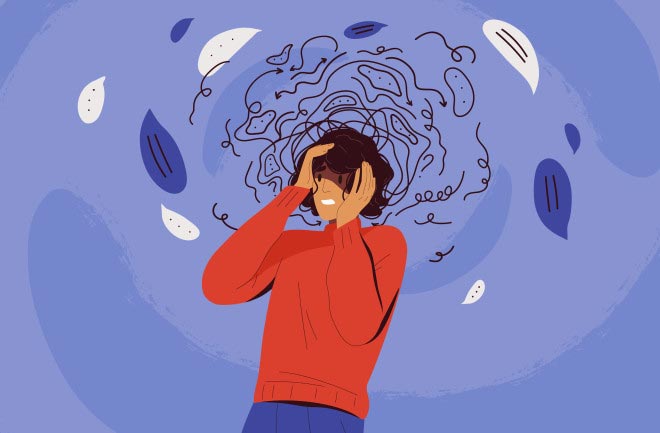What is an anxiety attack? Is it the same thing as a panic attack?
A Panic Attack is a sudden episode of intense fear or anxiety with accompanying physical and psychological symptoms. Episodes are triggered by a perceived threat (internal or external) rather than imminent danger. Accompanying symptoms include feelings of losing control, “going crazy”, heart palpitations, chest pain, or feeling like you may pass out. Panic attacks and anxiety attacks differ in that panic suddenly appears while anxiety attacks build over hours or days. Panic attacks come on suddenly and usually subside over a few minutes, while anxiety attacks are more like peak episodes of anxiety within an already distressed state. The diagnosis of Panic Disorder comes about when the focus of one’s anxiety is avoiding future attacks. Both are highly amenable to anxiety treatment and psychotherapy.
What causes panic attacks?
Anxiety and panic attacks are not the same experience for everyone although they may share a common symptom cluster. In some instances, childhood trauma and chronic instability can be at the bedrock of a more anxious personality type. Research points to a subset of people who have unresolved childhood PTSD that morphs into a version of Generalized Anxiety Disorder (GAD) as adults. This “keyed up” state lends itself vulnerable to panic and anxiety. Research also suggests that some genes play a role in having a “revved up” central nervous system as well. If this is the case, and you add unconscious triggers to previous trauma (like feeling of intense vulnerability, instability, loss or abandonment amongst a host of other potential earlier in life factors) panic can ensue.
There are also cases where chronic or acute stress plays a major role in bringing on panic and anxiety attacks. Ongoing persistent job stress, burnout, death of a loved one, divorce, a job loss, school stress, etc. can be at the root (these are often in tandem too). Most people need professional anxiety treatment to begin to identify and work through the major factors that are at play in their unique situation. The culprit is not always obvious when you are deep inside of an episode of panic or anxiety.
How do I get some immediate relief from anxiety and panic attacks?
As described above, it takes some time to identify and begin working on the deeper factors driving the anxiety and panic. This is the vital component of weekly psychotherapy. However, if you are looking for some ways to cope with panic before making it into treatment here are some ideas.
First, the work you need to do to manage panic is not done in the moment, it is a skill that needs to be developed through regular mindfulness practice. Keep in mind, learning to meditate in a warzone lifestyle or within chronic debilitating trauma/stress isn’t a good idea. We would never want to teach you how to be optimally comfortable in a style of life that is fueling panic and anxiety. Having said that, research is clear that instituting a regular meditation practice into your life can greatly reduce symptoms and episodes of anxiety. When combined appropriately with anxiety treatment within psychotherapy, it is a necessary but not sufficient agent of change. Apps like “Waking up” by Sam Harris are a great resource for this. He has a 28-day course that is phenomenal and can get you started on the right track. You will notice some benefit almost immediately and exponentially if you can commit to the 28 consecutive days.
Second, you want to begin paying attention to the internal and external cues associated with episodes. I suggest writing down the elements in your environment (people, places things, events that happened in the hours leading up) even if they seem totally random. You also want to do the same for your internal world. Identify what thoughts seemed to be present, the chain of those thoughts, and what obvious or even more subtle emotions you were experiencing just before the attack set in. These is a helpful tool called a “Behavioral Chain Analysis” that can help with this too (google it). Having some awareness of these factors can help jumpstart therapy and create a focus for your anxiety treatment.
Is there anything I can do in the moment to manage an anxiety attack? Is there treatment for anxiety?
While you wait to start therapy there are some quick tools you can use to manage attacks. First, Diaphragmatic breathing is critical. When in an acute panic attack breathing becomes shallow and rapid, this often increases the body’s fight or flight responses and augments the experience of panic. It feels counter-intuitive in the moment but getting control of your breath can bring a lot of relief. Focus on the rising and falling of the diaphragm with each breath using a technique called 5-2-7 breathing – 5 seconds of in-breath through the nose, 2 second pause between breaths, 7 second out-breath (breathe out like you are blowing out birthday candles slowly).
Second, use something called “grounding.” Grounding works against the depersonalization and dissociation people experience during anxiety attacks by connecting you back into the present moment. To do this, you want to begin slowly naming objects in your immediate surrounding including the colors, shapes and details of those objects. You also want to engage your environment using touch, it may sound corny but tactile grounding is really helpful in the moment. You can do this, for example, by feeling the texture of the chair you are sitting on, the clothing you are wearing, or any other nearby object you can feel and touch. Close your eyes and focus your attention on sensing that object through touch.
Lastly, in therapy, you want to start working on putting words to emotional experience. Anxiety and panic attacks are often the result of repressed feelings and experience. We have noticed that people who have some semblance of alexithymia (lack of words of affect states and feelings) tend to experience panic. These unconsciously threatening emotions are often at the root of an ongoing panic disorder and working with your therapist to identify just what these are for you is incredibly important. Just learning new skills to manage anxiety and panic are not enough – you have to get to the root of things to solve the problem in a lasting, meaningful way. For those with chronic anxiety, a fundamental and existential shift is required in how you approach life’s ambiguity, uncertainty, and challenges. It is the role of a therapist to help you identify how to do this, where you get stuck, and how certain issues of the past block your ability to participate in life openly and without constant control. We often have blind spots in the areas most important to this element of the change process. We want to help you heal on a deeper level so you don’t need need to live a life relying on coping skills to get by.
Our team wants to help you get past anxiety and back into a life you can enjoy. We offer expert anxiety treatment here in our clinic and take pride in having a successful track record. Please reach out to us with any questions or concerns you might have.
Keil Psych Group
714-334-5497





